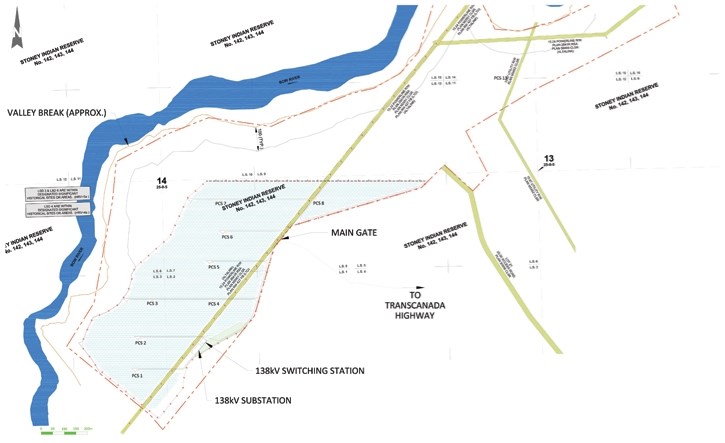STONEY NAKODA – Nearly nine months after rejecting a referendum to set aside reserve land for commercial development, members of the Stoney Nakoda First Nation will head back to the polls on Oct. 18 to vote on the same referendum question again.
Like the first referendum held in February, voters will decide whether or not to designate seven parcels of land for development in Morley, Eden Valley and Big Horn.
If the referendum is successful, the parcels of land will become available to lease for up to 99 years, or until 2117. The land will not lose reserve status or be surrendered to the Government of Canada.
During the first referendum, 653 people voted ‘no,’ counting for 53.7 per cent of the final vote, while 558 voted ‘yes.’
Despite the result, the Stoney tribal council immediately stated it would hold another referendum and has vowed to continue to hold referendums until it passes.
“It’s going to keep coming back until it passes,” said Jordie Mark, a Chiniki councillor and the youngest elected official with the Stoney Nakoda tribal council.
“What more can we do? This is the only way. If you want to develop anything, start any development, this is what you need to do.”
He said the referendum is similar to rezoning an area for development in a town or a city and it is the first step toward creating more economic development and jobs on the impoverished reserve.
“The land designation process is required under the Indian Act in order to zone land for future economic land development, whether for residential, agricultural, recreational, industrial, commercial or other uses, as decided by the Nations,” stated a press release by the Stoney tribal council on Sept. 15.
“Because of the close voting decision, the tribal leadership decided to undergo a second community referendum vote in order to ensure that the Nations’ people were fully engaged and that voters were fully informed, as land designation is an important decision.”
According to a brochure on the issue, before a lease is issued the Nation will ensure the proposed business will be profitable and create jobs. The Nation will also outline requirements to protect the environment and site cleanup should a business fold.
If the referendum is approved, Mark said it will also help boost the Nation’s declining revenue streams.
“As elected officials we felt it was our duty and obligation to seek other sources of revenue and I think we mentioned in the first referendum that our oil and gas revenue is not doing too well and we felt it was time that we explore other ventures as well.”
In the weeks leading up to the first vote, Morley community members expressed wariness about approving the referendum. Concerns included lack of notice, uncertainty about how the land would be developed and worries that the plan might not result in the economic development and jobs it promised.
Nearly a month later, those concerns appeared to be justified as news quietly emerged that the Chiniki band had plans to build a 160-hectare solar energy project on one of the parcels of land included in the referendum.
Despite rejecting the referendum, an application for construction and operation of a 25-megawatt solar power generation facility was officially submitted to the Alberta Utilities Commission (AUC) on March 13. The application was still being processed as of press time.
This time around, Mark said, people are aware of the solar project proposal.
“We felt that we have always been transparent. We wanted to wait and see and get actual confirmation before we announced anything,” said Mark. “We didn’t want to create any false hope.”
He acknowledged part of the reason the referendum failed the last time around was because a large segment of the community didn’t trust their elected officials. This time around he emphasized that are trying to restore people’s faith by being as transparent as possible.
“We are doing everything we can,” said Mark. “I’m trying to be transparent, I’m trying to do my best.”
To try and gain the public’s trust, he said officials are committed to answering any questions people may have about the referendum.
“All we can do at this point is provide as much information as they require. Any questions that they may have, any type of information sessions that they may want, whether we do that through community meetings or door-to-door visits, we are willing to provide that information.”
He urged members of his community to get as much information as possible to help them make an informed decision before they vote.
“Get the facts and base your decision on that,” said Mark. “I respect people that say no, but say no knowing full well what you’re saying no to.”
The seven parcels of land included in the referendum affects seven per cent of the total land base, or approximately 3,000 hectares of reserve land. The parcels are located in the Morley town site, near the Chiniki Cultural Centre, the Nakoda Lodge, in the east and west end of Morley, Eden Valley farm lands, and the Big Horn gas bar.
For more information about the referendum, go to www.stoneynation.com. There will also be five public meetings, with the first one held on Sept. 27.




